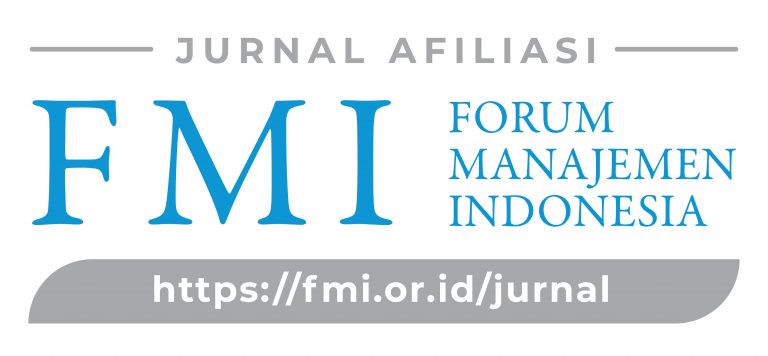EMPLOYEE PERFORMANCE IMPROVEMENT INFLUENCED BY PARTICIPATIVE LEADERSHIP, INTERPERSONAL COMMUNICATION AND JOB SATISFACTION AT PT PUTRA WIJAYA KLATEN, CENTRAL JAVA
DOI:
https://doi.org/10.55732/unu.gnk.2022.04.2.6Keywords:
Participatory Leadership, Interpersonal Communication, Job Satisfaction, Employee PerformanceAbstract
The purpose of this research is to determine and analyze the effect of participative leadership, interpersonal communication, and job satisfaction on employee performance at PT Putra Wijaya, Klaten, Central Java. This research uses causal-comparative research. The research object is the transportation service company PT Putra Wijaya, Klaten, Central Java. Research data were obtained by distributing questionnaires. The population of this research is all employees who work at PT Putra Wijaya, Klaten, Central Java. This research utilizes 77 respondents. The results prove that participative leadership, interpersonal communication, and job satisfaction have a significant effect on employee performance. This research proves a strong influence on job satisfaction.
References
Alromaihi, M. A., Alshomaly, Z. A., & George, S. (2017). Job satisfaction and employee performance: A theoretical review of the relationship between the two variables. International Journal of Advanced Research in Management and Social Sciences, 6(1), 1-20.
Bangun, W. (2018). Manajemen Sumber Daya Manusia. Erlangga. Jakarta
Basri, S. K., & Rauf, R. (2021). Pengaruh Semangat Kerja dan Kepuasan Kerja terhadap Kinerja Pegawai. Yume: Journal of Management, 4(1).
Berger, C. R., & Roloff, M. E. (2019). Interpersonal communication. In An integrated approach to communication theory and research (pp. 277-292). Routledge.
Chan, S. C. (2019). Participative leadership and job satisfaction: The mediating role of work engagement and the moderating role of fun experienced at work. Leadership & Organization Development Journal, 40(3), 319-333.
Diana, E. A., Mukhtadi, & Anwar, A. (2022). Creating the path for quality of work life: A study on nurse performance.
Fajri, C., Amelya, A., & Suworo, S. (2022). Pengaruh Kepuasan Kerja dan Disiplin Kerja terhadap Kinerja Karyawan PT. Indonesia Applicad. JIIP-Jurnal Ilmiah Ilmu Pendidikan, 5(1), 369-373.
Gentari, R. E., & Sumiati, S. (2019). Pengaruh Gaya Kepemimpinan Partisipatif dan Motivasi Terhadap Semangat Kerja Pegawai pada Dinas Perindustrian dan Perdagangan Kota Cilegon. Sains Manajemen, 5(1).
Ghozali, I. (2018). Aplikasi analisis multivariate dengan program IBM SPSS 25.
Hartono, R., Efendi, E., & Nurwati, E. (2021). The Effect of Compensation and Motivation on Employee Performance with Job Satisfaction as Intervening Variables at Hotel XYZ, in Jakarta. Majalah Ilmiah Bijak, 18(1), 153-166.
Huang, X., Iun, J., Liu, A., & Gong, Y. (2010). Does participative leadership enhance work performance by inducing empowerment or trust? The differential effects on managerial and non‐managerial subordinates. Journal of Organizational Behavior, 31(1), 122-143.
Jing, Z., Jianshi, G., Jinlian, L., & Yao, T. (2017). A case study of the promoting strategies for innovation contest within a company. Science Research Management, 38(11), 57.
Kasmir. (2019). Manajemen Sumber Daya Manusia (Teori dan Praktik). Depok: PT Rajagrafindo Persada
Lalamentik, A. A., Kindangen, P., & Lengkong, V. (2017). Pengaruh Gaya Kepemimpinan, Komunikasi dan Kompensasi terhadap Kinerja Karyawan pada Kantor Pelayanan Kekayaan Negara dan Lelang (KPKNL) Manado. Jurnal EMBA: Jurnal Riset Ekonomi, Manajemen, Bisnis dan Akuntansi, 5(1).
Lawasi, E. S., & Triatmanto, B. (2017). Pengaruh komunikasi, motivasi dan kerjasama tim terhadap peningkatan kinerja karyawan. Jurnal Manajemen dan Kewirausahaan, 5(1), 47-57.
Mangkunegara, A. A. P. (2017). Manajemen Sumber Daya Manusia Perusahaan, Bandung : Remaja Rosdakarya.
Perera, H. N., & John, J. E. (2020). Teachers’ self-efficacy beliefs for teaching math: Relations with teacher and student outcomes. Contemporary Educational Psychology, 61, 101842.
Prajitiasari, E. D., Susanto, A. B., Awwaliyah, I. N., Tobing, D. S. K., & Abimantara, M. S. (2022). Pengaruh Kompetensi, Gaya Kepemimpinan Partisipatif Dan Budaya Organisasi Terhadap Kinerja Karyawan Pesenkopi Di Malang. Value: Journal of Business Studies, 1(1), 41-54.
Rue, L. W., & Byars, L. L. (1980). Management : theory and application (Rev. ed.). Homewood: R. D. Irwin.
Salim, E., Hendri, H., & Robianto, R. (2020). Strategi Pengembangan Usaha dan Peningkatan Kinerja Dalam Menghadapi Era Digital Pada UMKM Café Tirtasari Kota Padang. JMM (Jurnal Masyarakat Mandiri), 4(1), 10-17.
Setiawan, A. (2017). Pengaruh gaya kepemimpinan partisipatif terhadap kinerja karyawan melalui motivasi kerja dan kepuasan kerja. Agora, 5(2).
Solomon, D., & Theiss, J. (2020). Culture and Interpersonal Communication. In Interpersonal Communication.
Sugiyono (2020). Metode Penelitian Kuantitatif, Kualitatif, dan R&D. Bandung : Alphabet.
Sugiyono. (2018). Metode Penelitian Pendidikan Pendekatan Kuantitatif, Kualitatif, dan R&D. Bandung: Alfabeta.
Vardaman, G. T., & Halterman, C. C. (1968). Managerial control through communication; systems for organizational diagnosis and design.
Vroom, V. (1964). Work and Motivation. Jhon Wiley and Sons, 9.
Winarja, W., Sodikin, A., & Widodo, D. S. (2018). The effect of Organizational commitment and job pressure to job performance through the job satisfaction in employees Directorate transformation Technology Communication and Information Indonesia. International Journal of Business and Applied Social Science, 4(2), 51-70.
Downloads
Published
Issue
Section
License
Copyright (c) 2022 Novianto Eko Nugroho

This work is licensed under a Creative Commons Attribution 4.0 International License.
Authors who publish with this journal agree to the following terms:
Authors retain copyright and grant the journal right of first publication with the work simultaneously licensed under a Creative Commons Attribution License that allows others to share the work with an acknowledgement of the work's authorship and initial publication in this journal.
Authors are able to enter into separate, additional contractual arrangements for the non-exclusive distribution of the journal's published version of the work (e.g., post it to an institutional repository or publish it in a book), with an acknowledgement of its initial publication in this journal.
Authors are permitted and encouraged to post their work online (e.g., in institutional repositories or on their website) prior to and during the submission process, as it can lead to productive exchanges, as well as earlier and greater citation of published work (See the Effect of Open Access).
















